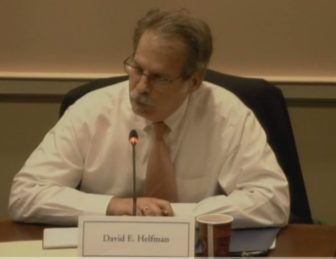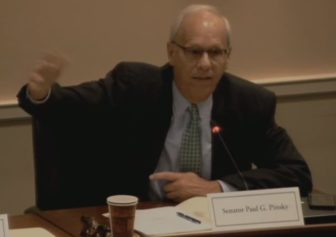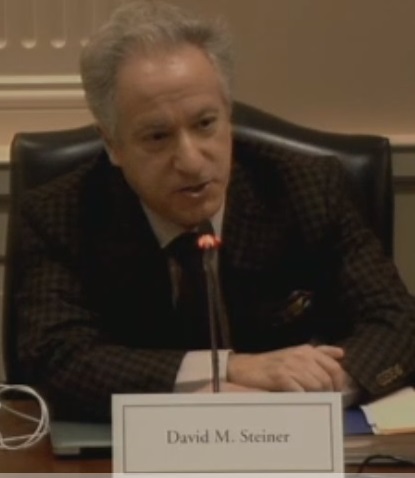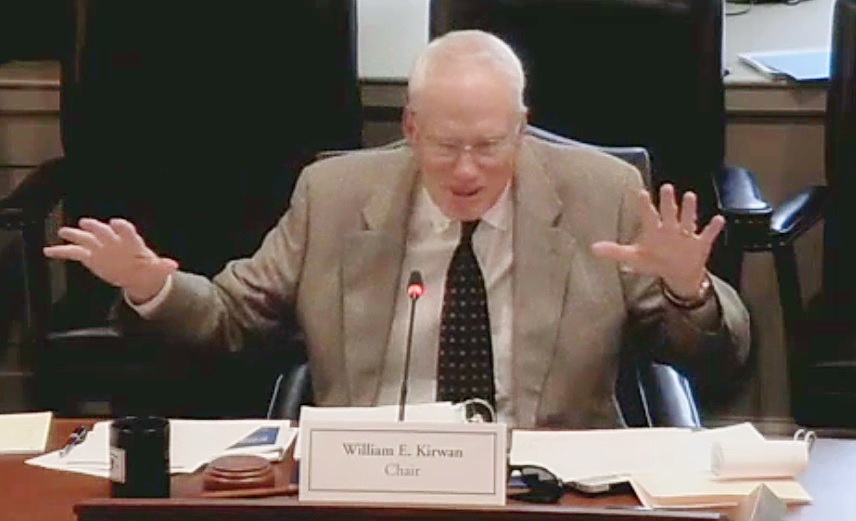By Len Lazarick
The commission charged with revising state school funding formulas will not be able to finish its work by its Dec. 31 deadline, commission chair Brit Kirwan told the panel Wednesday.
“It will take more time to do our work completely and accurately,” said Kirwan, the former university system chancellor.
The Commission on Innovation and Excellence in Education is trying to reach consensus on major changes on how the state and local governments should spend the largest single slice of state and local budgets.
Kirwan’s announcement comes as no surprise to anyone who’s been following the slow progress of the commission’s work over the past year.
But the delay disappointed commission members representing teachers and local school systems hoping to get funding formulas updated for the first time in 15 years.
Disappointment

David Helfman , executive director, MSEA
“I’m pretty deeply disappointed by this turn of events,” said David Helfman, executive director of the Maryland State Education Association, the union representing over 70,000 educators. “Delaying this process does not address the unmet needs” of school systems he’s heard at the hearings the commission has held around the state.
Carroll County Schools Superintendent Stephen Guthrie, representing the state’s 24 superintendents, agreed that the delay was necessary until they reach consensus. But “we have a current need to correct funding formulas,” in addition to providing additional money, Guthrie said.
Leslie Pellegrino, chief financial officer of Frederick County Public Schools, representing the Association of School Business Officials, said that after 2008, state cuts slowed promised funding increases.
“We continue to fall further and further behind,” Pellegrino said. Despite maintenance-of-effort laws on school funding, “we’re not maintaining…. We need catch up on that.”
A consultant has already recommended that state and local government spend $2.9 billion more than the $12 billion already going toward K-12 education, a 29% overall increase. The state share would increase by $1.9 billion and the counties would pick up the rest.
Broad agreement, few specifics
Chester Finn, a member of the State Board of Education and former education professor, said, “I would love to be done with this by New Year’s Eve.” But if the group’s recommendations would require a tax increase, “it would be folly to produce this in an election year.”
There seems to be broad agreement for Maryland to implement the nine building blocks recommended by the National Center for Education and the Economy based on their study of high-performing schools in other countries (See list at bottom of story). But the gist of the timing problem is that the Kirwan commission has not gotten into specific recommendations, what they would cost and who would pay for them.

Sen. Paul Pinsky
Sen. Paul Pinsky, a commission member who chairs the Senate’s education subcommittee, said that the commission can’t propose legislation “until we’re concrete in what we’re recommending.”
“We have to show the people we can make a difference,” Pinsky said.
Kirwan said that the commission recommendations needed to “set the stage for a groundswell of public support.”

David Steiner
David Steiner, a state board member and director of the Institute for Education Policy at Johns Hopkins University, said funneling more money into schools without changing how the money is directed is not the answer to improving student performance.
“Business as usual isn’t getting it done,” said Steiner, former education commissioner for the state of New York.
Four more meetings
Kirwan proposed the commission get as much done in its four meetings before the end of the year and then create a work group to meet with the legislative staff and consultants to determine what its recommendations would cost. He said it was not unusual for major commissions to ask for more time to finish their work.
NCEE President Marc Tucker told the committee that if the commission recommended some of his group’s nine proposed “building blocks” without making changes in the structure of education, “you would have a bill you could not pay.”
The consultants plan to work up a “dynamic model” for the cost of the each recommendation. That would predict “If we increase this, how much would we save on that,” Tucker said.
He said the best practices of the high-performing schools in Shanghai, Singapore and elsewhere “spend not much more than we do,” but achieve better results.
Rachel Hise, chief staff person for the commission from the Department of Legislative Services, said, “What we’re doing has not been done before.”
“Really difficult decisions are going to have to be made,” Hise said. “None of these are going to be easy.”
Kirwan said, “There will be genuine calls for new money,” but “there will be things that we are doing differently.”
Nine Building Blocks: What it will take for Maryland to compete
Here are the nine building blocks recommended by the National Center for Education and the Economy, with a link to Tucker’s initial presentation spelling out “What It Will Take For Maryland To Compete With The Best Education Systems in the World.”
- Strong supports for children and their families.This includes comprehensive supports for families with young children, from family allowances to prenatal care to nutritional assistance and more affordable day care, preschools and early childhood education.
- More resources for students who are harder to educate:The United States is the only advanced country in which children of the wealthy get more financial support than children of the poor, Tucker said. They also need more teachers per student and, in some cases, the best teachers, in schools serving disadvantaged students.
- World-class, highly coherent instructional systemswith internationally benchmarked student performance standards and matching curriculum frameworks.
- Qualification systems with multiple no-dead-end pathways for students to achieve those qualifications. No high school diploma but requirements at the end of each education stage to match the requirements for beginning the next stage.
- Abundant supply of highly qualified teachers. Recruit most teachers from upper segment of high school graduates. Move teacher education into research universities with entrance requirements like those of selective universities and give them tough content with research requirements. Have elementary teachers specialize in fields, such as math and language.
- Schools organized and managed to attract high quality candidates into teaching and to enable them to do their very best work.There should be a career ladder for teachers and school leaders combined with strong incentives for teachers to get better and better at the work. More time should be spent working together in teams to improve school performance, less teaching. Compensation should not be based on degrees and seniority.
- An effective system of career and technical education and training, built on very high level of student academic performance. It should have highly qualified instructors, modern equipment, and a strong apprentice component; a training wage; and strong employer involvement.
- Leadership development system that develops leaders who can manage such systems effectively.Only those who have been fine teachers, team leaders and mentors can go on to leadership positions and they must have experience in low-income and minority schools to move up.
- Coherent governance system capable of implementing effective systems.Built on professional model. The system sets the rules, provides resources, but teachers and principals have professional discretion, and accountability runs up and down
Tucker emphasized that many of these nine developments take 20 or 30 years to implement in other countries and require a long-term commitment to systemic change.
Related Stories
Billions more in school aid sought, but commissioners question results
Education commission not just about money, but how it’s spent, and what it achieves



On No. 1, you can’t make families care. Nos. 5 and 6 are great on paper, but society uses teachers/schools as babysitters. How are teachers supposed to focus on educating, without burnout? Or fear? And the Greatest truth, “it would be folly to produce this in an election year.”
Maybe the members of the Kirwan Commission should not get paid for their incompetence…
But then again, this is Maryland where incompetence is encouraged and rewarded…
I also believe that it’s long past time to encourage homeschoolers and those who send their children to private schools by allowing them to deduct their expenses from their income…
The students would be far, far, better off and college ready than what’s coming out of our so-called “education system” that promotes everything but learning…
On #3. NO! We already have been saddled with Common Core and test based accountability. How has that turned out? DREADFUL. No more experimenting on our children and testing them to death.
On#5. NO. No high school grads should be teaching students (seems like a TFA scam to me). Parents want trained and qualified, college educated teachers. Absolutely wrong to move the education field into research Universities (we don’t want our children tested…we want them taught!)
How about we save some MILLIONS of dollars and cut ties with the testing industry (Pearson/PARCC, NWEA/MAP, iReady, TSGold/KRA etc etc etc). How about we get rid of the Common Core curriculum and have teachers write curriculum that is age appropriate and not test centered. How about we forget about Singapore and Shanghai (test centric style) and look at how they teach children in Finland. How about we trim some fat at MSDE….that means you Finn and Smarick!
We have a bunch of bozos at MSDE that have no right making decisions about the education of our children.